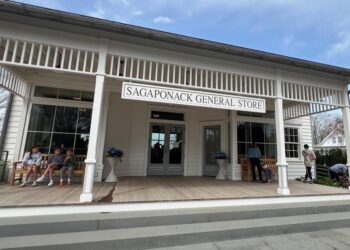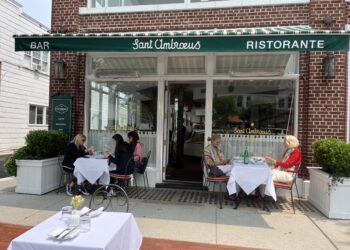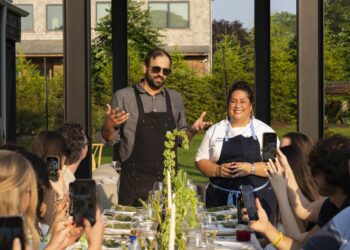Sean Barrett, a co-founder of Dock to Dish Montauk Restaurant Supported Fishery (RSF), grew up on the East End of Long Island. “I have been involved with fishing and restaurants my entire life. Since we were young kids we would make dinner at night with what we caught that day, that’s how we grew up,” he noted. “Then a few years ago I was in Spain’s Basque Country and noticed the fishermen coming in and bringing their catch directly from the harbor straight into the local restaurants. A light bulb turned on.” Hence the birth of Dock to Dish, Barrett believed “We can be the salt water brother of the farm-to-table movement” thus laying the blueprint which has “become uniquely qualified in providing local chefs and members of their cooperatives with impeccably fresh seafood harvested with the consumer and the planet in mind.”
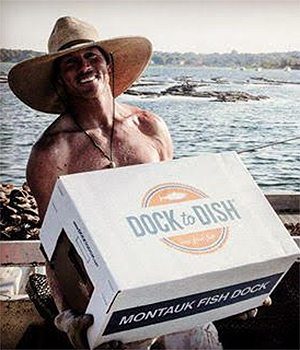 |
|
Dock to Dish hopes to fundamentally change seafood marketplaces. (Courtesy Photo) |
“The Montauk programs were originally organized by Barrett, along with 31 small-scale commercial fishermen and traditional shellfish harvesters,” and was launched in 2012 in Montauk with cooperation and assistance through the Concerned Citizens of Montauk, and Executive Director Jeremy Samuelson.
Additionally, the original Dock to Dish RSF program was also “co-founded by well-known farm-to-table chef and author, Dan Barber, and his brother, David, co-owners of Blue Hill at Stone Barns” (New York City and Westchester County). That program now consists of over two dozen premier restaurant members in New York City. Since its inception on the Atlantic seaboard, subsequent Dock to Dish RSF programs have been established on the Pacific Coast under the leadership of Chef Michael Cimarusti and Chef Niki Nakayama in Los Angeles; and Chef Ned Bell in Vancouver, British Columbia.
The program has “Pioneered unique community-based seafood sourcing programs which provide forward-thinking chefs and members of cooperatives with direct dock access to incredibly fresh, wild, sustainable seafood that is accurately curated and fully traceable to the source of origin and fisher who harvested the haul.”
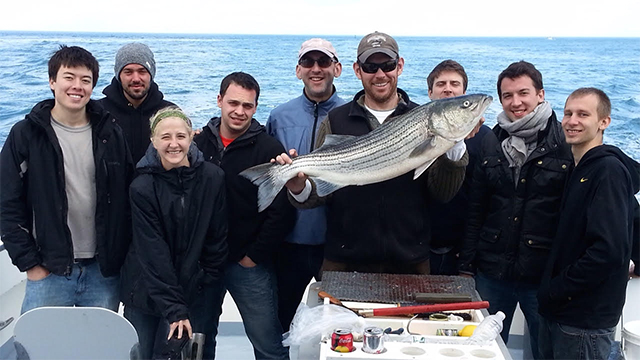 |
|
The program’s goal is to provide our members with access to fresh, premium, locally caught and sustainable seafood directly from the dock. (Courtesy Photo) |
The benefits to fishermen, chefs and restaurateurs have proven immense and deeply rewarding, “because the fishermen are paid by cooperative members in advance in exchange for set shares of future hauls, dramatically less fish are harvested from the wild and much less impactful methods can be used in the capture.” It also has an impact on overfishing. “Concurrently, a much broader variety of underutilized species are provided to the cooperative members which drastically reduces harvest pressure on the often depleted stocks of the most popular and over fished favorites, like tuna and snapper,” notes the Dock to Dish website. “This supply-driven system reverses the historical demand-based value chain, restoring balance and allowing fishermen to become better stewards of their ecosystems while prudently conserving the natural capital of the local fishery.”
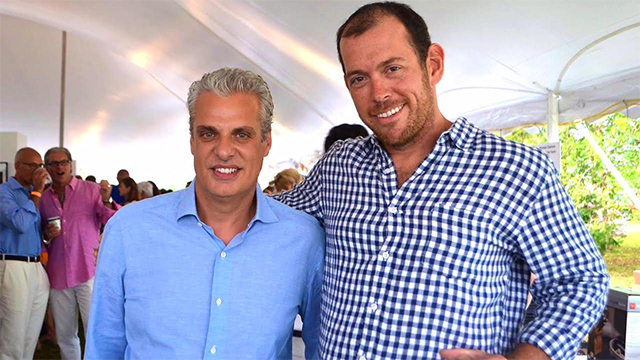 |
|
Chef Eric Ripert of Le Bernardin and Sean Barrett. (Courtesy Photo) |
Having established the first RSF program in North America, Barrett continues, “Last season we had 25 restaurants that are members, but we have over 100 restaurants on the waiting list, and we consider them to be just as committed to the movement. I am eternally grateful to Nick & Toni’s owner, Mark Smith, and Chef Joseph Realmuto, as they were the first to come on board and embrace the concept and helped to build and structure the program here on Long Island.”
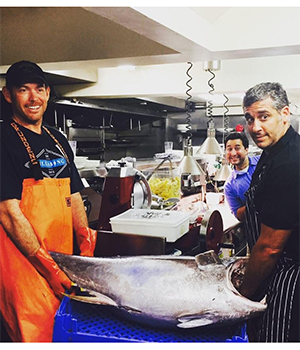 |
|
Sean Barrett and Chef Joseph Realmuto show off a fresh catch. (Courtesy Photo) |
“Last fall we launched a program in Vancouver, and have been looking for a gateway into Central and South America. In Quepos, Costa Rica we networked with wonderful, forward-thinking people who had the right motivation and commitment, and our objectives, goals and mission aligned perfectly,” says Barrett. “So through a unique collaboration between Jeremy Allen of Arenas del Mar, the acclaimed five-star carbon neutral rainforest resort of the Manuel Antonio National Park, and Hans Pfister, Executive Director of the Cayuga Collection, which consists of eight award-winning eco-lodges, hotels and resorts throughout Costa Rica and Nicaragua, the program will launch on Monday, May 30, with a ceremonial community seafood dinner for participating fishermen and their families prepared by Chef Nakayama, and Sous Chef Carole Lida, at Arenas del Mar Resort.”
Barrett’s continued heartfelt commitment and dedication to the movement, was revealed when he stated, “Moving forward, we need to measure and value all of the social and environmental impacts that are inherently involved in the capture of any wild seafood, and account for these impacts in the bottom-line. We need to move to a new symbiotic system where restoring wild fish stocks and preserving the livelihoods of small-scale fishermen are the two equally balanced focus points. This all needs to be done while making sure that local underutilized species are showcased, with an unwavering insistence on source transparency.” It might look like a daunting endeavor to some, but not to Barrett. “That probably sounds like a lot of work, because it is, but the good news is that all of that restructuring is precisely what Dock to Dish RSF programs have already done, and continue to do, in other regions; and it is precisely what we intend for the outcomes to be in Costa Rica,” he added.
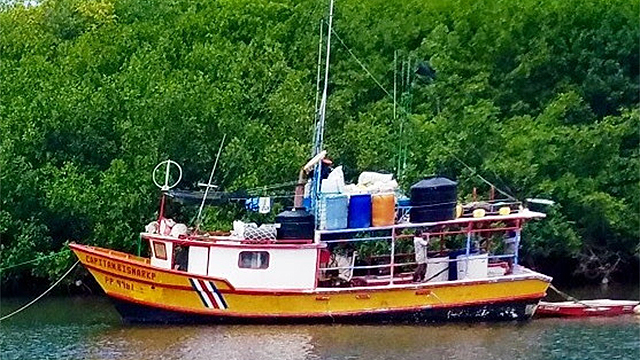 |
|
Commercial fishing vessel in port of Quepos, Costa Rica. (Photo: Brooke Pascoe of Dock to Dish) |
Dock to Dish Montauk is proud that the program has been accepted on the West Coast, and now globally. “The genesis of this idea and our deepest roots are based in Montauk and Amagansett, and we are thrilled that the idea has taken root on an international level,” Barrett concluded. “I now spend about three to four months on the road, instituting our blueprint which, after lots of trial and error, has proven to be transferable so that programs can be initiated with relative ease by pooling resources so that both the community and the local restaurants receive access to steady amounts of wild harvest fish and forge personal relationships with the fishermen landing the hauls, thereby restoring transparency and accountability into an otherwise opaque marketplace.”
For more information on Dock to Dish, visit docktodish.com.


